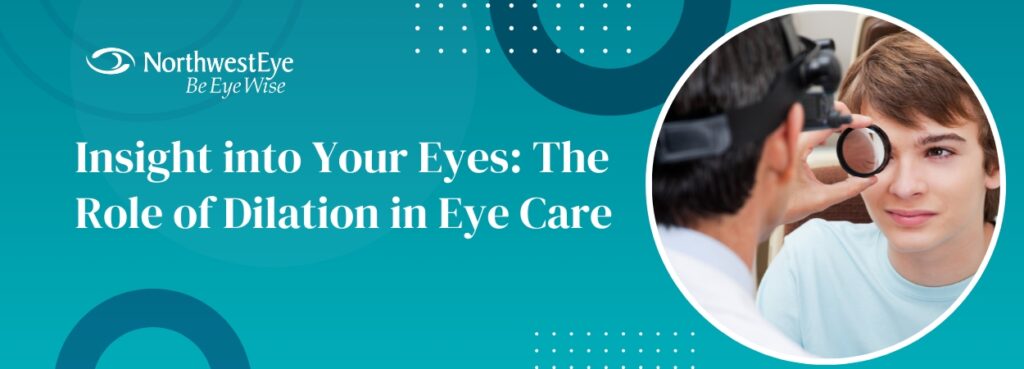Posted by: Northwest Eye in News on May 14, 2024

Have you ever wondered why eye doctors dilate your eyes during an exam? It may seem like a minor inconvenience, but there’s a crucial reason behind this common practice. At Northwest Eye, we believe in the importance of comprehensive eye care, and dilation is a fundamental aspect of ensuring the health and wellness of your eyes.
What is dilation and why do we do it?
Dilation uses eye drops to enlarge the black part of your eye, the pupil. Widening your pupil allows more light to enter your eye, giving your doctor a better view of the inside. Dilations allows providers to examine the retina, optical nerve, and blood vessels. These structures provide vital insight into your eye health and can reveal early signs of various eye conditions and diseases. By detecting issues early on, providers can implement timely interventions and preserve your vision and prevent further damage.
Conditions such as cataracts, glaucoma, macular degeneration, diabetic retinopathy, and even certain types of cancer can be identified through dilation. Without dilation, these conditions might go undetected until they reach advanced stages, making treatment more challenging and less effective.
Why not just rely on other methods of examination such as specialized instruments?
While advanced technology has improved our ability to diagnose eye conditions, dilation remains essential for obtaining a comprehensive view of the eye’s interior. Additionally, it can allow providers information into your overall health beyond your eyes. By monitoring these changes over time, your provider can collaborate with other healthcare providers to manage your health beyond your vision.
Is it necessary to have my eyes dilated at every eye exam?
The necessity of your eyes being dilated depends on the reason or your exam, your age, your overall health, and your risk of eye diseases. In determining if your eyes need to be dilated, your eye doctor may consider:
- Your Age. The risk of eye diseases increases with age which is why if you are over 60 years of age, it is recommended you have a dilated eye exam every year.
- Your Ethnic Background. Certain ethnicities are at increased risk of some eye diseases. For example, individuals of African or Hispanic descent, have an increased risk of developing glaucoma and are advised to have a dilated eye exam every year starting at 40 years old.
- Your Eyes and Overall Health. If you have a history of eye conditions such as cataracts, retinal disorders, or a family history of eye disease, dilation may be necessary to monitor for change or signs of progression. Similarly, if you have systemic health conditions like diabetes or high blood pressure, dilation may be recommended to assess further complications.
- Your reason for seeking an eye exam. If you’re experiencing specific symptoms such as blurry vision, eye pain, or flashes of light, dilation may be necessary to investigate the underlying cause. Additionally, if you’re due for a comprehensive eye check-up or if it’s been several years since your last exam, dilation allows for a thorough evaluation of your eye health, even in the absence of symptoms.
Are there any side effects to a dilated eye exam?
Having your eyes dilated can be accompanied by temporary side effects that last only a few hours which include sensitivity to light, blurry vision, and difficulty focusing on nearby objects. This happens because the eye drops temporarily paralyze your eye’s ability to control its pupil size. While discomfort is mild, wearing sunglasses, having a driver for your first time dilated, giving yourself time to adjust, and staying hydrated can alleviate symptoms.
At Northwest Eye, we’re dedicated to providing you with the highest standard of care, ensuring that every aspect of your eye health is thoroughly evaluated. Whether you’re due for a routine check-up, experiencing symptoms, or simply seeking peace of mind, our expert team is here to guide you every step of the way. Don’t wait until vision problems arise—schedule your appointment today by requesting an appointment here or calling us at 763-416-7600. Your eyesight is our priority, and we look forward to serving you with compassion and expertise.






